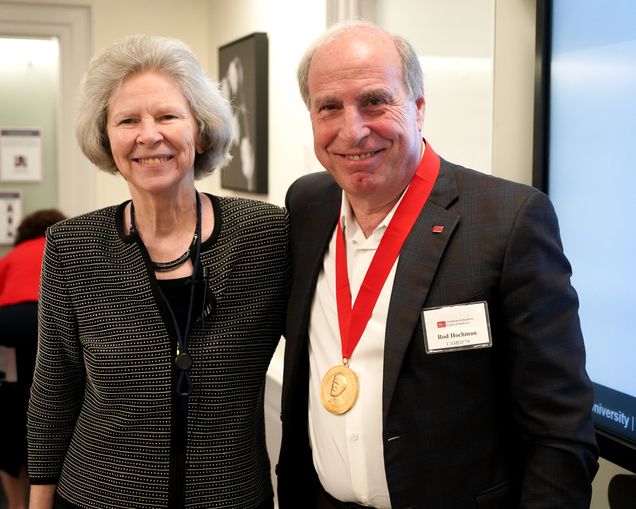Where clinicians practice to learn—and learn to practice
Opening in 2025, the Rod Hochman Family Clinical Skills & Simulation Center is generously funded by Rod Hochman, MD (CAMED’79, CAS’79) and Nancy Hochman (Sargent’77,’83)
With a strong tradition of teaching excellence and research innovation, the Aram V. Chobanian & Edward Avedisian School of Medicine is a choice school for outstanding medical students, especially those dedicated to clinical excellence, re- search, leadership, and advocacy for diverse patients. Now, thanks to a transformative gift from two Boston University alumni, the school is about to significantly improve its clinical skills facility.
Rod Hochman, MD (CAMED’79, CAS’79) and Nancy Hochman (Sargent’77,’83) have generously donated $10 million to build and operate a new, much larger, cutting-edge center for clinical skills development. Scheduled to open this year, the Rod Hochman Family Clinical Skills & Simulation Center (CSSC) on the sixth floor of the School of Medicine Instructional Building will feature new, state-of-the-art technology and expanded spaces for MD, physician assistant (PA), mental health, and genetic counseling students to learn communication skills, physical examination, medical procedures, and team-based care.
By funding the new CSSC, the Hochmans will facilitate the development of exceptional clinical skills for future generations of students, notes Karen H. Antman, MD, dean of the medical school and medical campus provost. “They can learn to empathetically listen to patients, learn physical diagnosis, and practice procedures. They will find a simulated cancerous mass in a manikin and then know what to look for in a patient. The CSSC is where a student begins to learn to be a doctor, PA, or genetic counselor,” she says.

“I have been so impressed with the wonderful accomplishments of our school and its graduates. We hope this will be a legacy to our present and future students.”
— Rod Hochman, MD, pictured with Dean Karen H. Antman
A legacy of transforming healthcare
The Hochmans have a decades-long history of supporting the school; they previously endowed a scholarship fund for medical students. Dr. Hochman also donates his time as a member of the School of Medicine Dean’s Advisory Board.
In addition to their philanthropic efforts, both have dedicated their careers to improving healthcare. From 2016 to 2024, Dr. Hochman served as president and CEO of the healthcare organization Providence, where he led the seven-state health system and oversaw its network of hospitals, clinics, and other healthcare programs and services. Before Providence, he served as president and CEO of Swedish Health Services and was a senior executive for Sentara Healthcare, the Health Alliance of Greater Cincinnati, and the Guthrie Health System. Dr. Hochman is also the former chair of the American Hospital Association and chair of the Catholic Health Association’s board of trustees.
Nancy Hochman, a physical therapist, practiced for nearly 30 years in clinics across the Northeast, including in Massachusetts, New York, and New Hampshire. She has served on boards and committees for organizations such as the Safe Crossings Foundation, Seattle Repertory Theatre, Swedish Medical Center, and the Swedish Community Specialty Clinic.
The Hochmans made their gift in 2024, a meaningful time for Dr. Hochman. It marked his 45th year in medicine, along with his 45th reunion at BU.
“On the 45th anniversary of my graduation, I have been so impressed with the wonderful accomplishments of our school and its graduates,” notes Dr. Hochman. “Dean Antman has been a tireless leader and advocate, particularly regarding advancements like the skills and simulation center. We hope this will be a legacy to our present and future students.
”Indeed, the new CSSC will enhance the education of BU’s students and improve the quality of the care they provide to patients. “This new clinical skills center will give our students dedicated space to engage in situational learning and face the complexities of medicine before they experience it with real patients,” says Associate Dean Priya Garg, MD. “Simulation is an essential active learning method in medical education, and we are grateful to have this gift.”
Inside the Hochman Family Center

Features of the center include:
More space (3x the size of existing CSSC) for teaching and learning, including 13 clinical skills rooms with four exam tables per room, and 13 examination rooms (for the Standardized Patient program and clinical skills assessments)
Four simulated emergency/hospital rooms with hospital beds, high-fidelity manikins, and cameras for debriefing
Upgraded technology including intercoms, one-way mirrors for student observation, video with recording capability that allows faculty to watch students remotely to provide feedback, and a sound system that allows communication throughout the entire space
New equipment including handheld ultrasound machines for point-of-care teaching, low- and high-fidelity simulation (including Student Auscultation Manikins), and a new baby manikin
Classroom VR technology to facilitate interdisciplinary collaboration with other BU schools and colleges, such as the School of Social Work or Sargent College of Health & Rehabilitation Sciences
